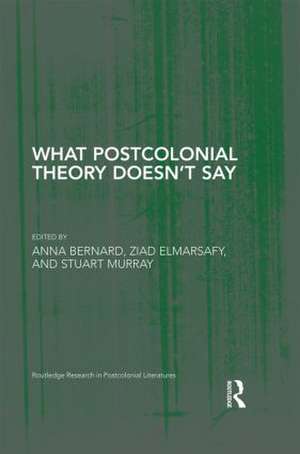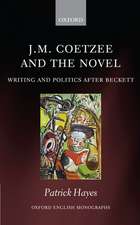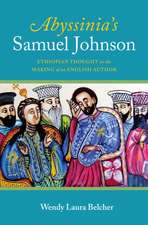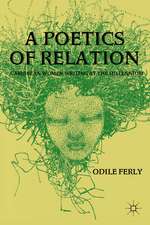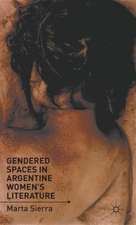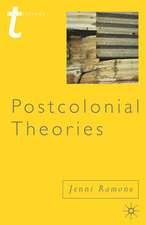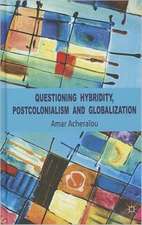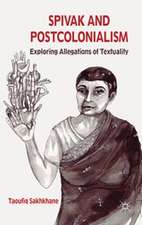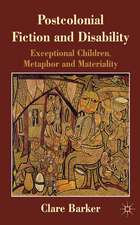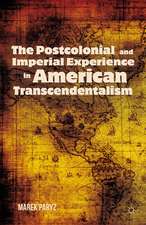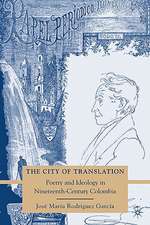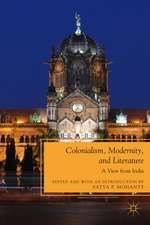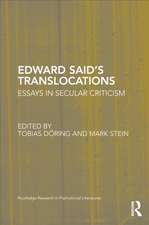What Postcolonial Theory Doesn't Say: Routledge Research in Postcolonial Literatures
Editat de Anna Bernard, Ziad Elmarsafy, Stuart Murrayen Limba Engleză Hardback – sep 2015
| Toate formatele și edițiile | Preț | Express |
|---|---|---|
| Paperback (1) | 449.41 lei 6-8 săpt. | |
| Taylor & Francis – 5 feb 2018 | 449.41 lei 6-8 săpt. | |
| Hardback (1) | 1111.55 lei 6-8 săpt. | |
| Taylor & Francis – sep 2015 | 1111.55 lei 6-8 săpt. |
Din seria Routledge Research in Postcolonial Literatures
-
 Preț: 311.41 lei
Preț: 311.41 lei - 9%
 Preț: 1003.52 lei
Preț: 1003.52 lei -
 Preț: 311.41 lei
Preț: 311.41 lei -
 Preț: 393.05 lei
Preț: 393.05 lei -
 Preț: 280.99 lei
Preț: 280.99 lei -
 Preț: 311.43 lei
Preț: 311.43 lei - 18%
 Preț: 1058.19 lei
Preț: 1058.19 lei -
 Preț: 344.32 lei
Preț: 344.32 lei - 18%
 Preț: 1112.65 lei
Preț: 1112.65 lei - 18%
 Preț: 1110.77 lei
Preț: 1110.77 lei - 26%
 Preț: 820.71 lei
Preț: 820.71 lei - 18%
 Preț: 1055.51 lei
Preț: 1055.51 lei - 18%
 Preț: 1005.39 lei
Preț: 1005.39 lei -
 Preț: 441.74 lei
Preț: 441.74 lei - 18%
 Preț: 1054.89 lei
Preț: 1054.89 lei - 18%
 Preț: 1112.34 lei
Preț: 1112.34 lei - 18%
 Preț: 1058.43 lei
Preț: 1058.43 lei -
 Preț: 462.81 lei
Preț: 462.81 lei -
 Preț: 463.14 lei
Preț: 463.14 lei - 18%
 Preț: 1055.32 lei
Preț: 1055.32 lei -
 Preț: 443.65 lei
Preț: 443.65 lei - 29%
 Preț: 260.33 lei
Preț: 260.33 lei - 18%
 Preț: 1054.71 lei
Preț: 1054.71 lei - 18%
 Preț: 1004.34 lei
Preț: 1004.34 lei - 18%
 Preț: 1056.63 lei
Preț: 1056.63 lei -
 Preț: 389.66 lei
Preț: 389.66 lei -
 Preț: 482.94 lei
Preț: 482.94 lei - 18%
 Preț: 1104.48 lei
Preț: 1104.48 lei - 18%
 Preț: 1114.30 lei
Preț: 1114.30 lei - 18%
 Preț: 1000.30 lei
Preț: 1000.30 lei - 18%
 Preț: 1057.09 lei
Preț: 1057.09 lei -
 Preț: 485.99 lei
Preț: 485.99 lei -
 Preț: 485.24 lei
Preț: 485.24 lei - 12%
 Preț: 339.94 lei
Preț: 339.94 lei - 18%
 Preț: 1053.16 lei
Preț: 1053.16 lei - 18%
 Preț: 1051.60 lei
Preț: 1051.60 lei -
 Preț: 384.86 lei
Preț: 384.86 lei - 18%
 Preț: 1006.77 lei
Preț: 1006.77 lei - 18%
 Preț: 1111.51 lei
Preț: 1111.51 lei - 18%
 Preț: 969.71 lei
Preț: 969.71 lei - 18%
 Preț: 1007.48 lei
Preț: 1007.48 lei
Preț: 1111.55 lei
Preț vechi: 1355.55 lei
-18% Nou
Puncte Express: 1667
Preț estimativ în valută:
212.69€ • 222.07$ • 176.03£
212.69€ • 222.07$ • 176.03£
Carte tipărită la comandă
Livrare economică 04-18 aprilie
Preluare comenzi: 021 569.72.76
Specificații
ISBN-13: 9780415857970
ISBN-10: 041585797X
Pagini: 284
Ilustrații: 13 black & white illustrations, 13 black & white halftones
Dimensiuni: 152 x 229 x 18 mm
Greutate: 0.52 kg
Ediția:1
Editura: Taylor & Francis
Colecția Routledge
Seria Routledge Research in Postcolonial Literatures
Locul publicării:Oxford, United Kingdom
ISBN-10: 041585797X
Pagini: 284
Ilustrații: 13 black & white illustrations, 13 black & white halftones
Dimensiuni: 152 x 229 x 18 mm
Greutate: 0.52 kg
Ediția:1
Editura: Taylor & Francis
Colecția Routledge
Seria Routledge Research in Postcolonial Literatures
Locul publicării:Oxford, United Kingdom
Public țintă
Postgraduate and UndergraduateCuprins
Introduction Anna Bernard, Ziad Elmarsafy, and Stuart Murray Part 1: Disciplinary Constellations: New Forms of Knowledge 1. Capitalizing on English Literature: Disciplinarity, Academic Labor and Postcolonial Studies Claire Westall 2. Dangerous Relations? Lessons from the Interface of Postcolonial Studies and International Relations Simon Obendorf 3. Managing Postcolonialism Mrinalini Greedharry and Pasi Ahonen 4. Postcolonial Modernism: Shame and National Form John C. Hawley Part 2: Case Studies: Geocultures, Topographies, Occlusions 5. Gaps, Silences and Absences: Palestine and Postcolonial Studies Patrick Williams 6. Facing/Defacing Robert Mugabe: Land Reclamation, Race and the End of Colonial Accountability Ashleigh Harris 7. Staging the Mulata: Performing Cuba Alison Fraunhar 8. Amongst the Cannibals: Articulating Masculinity in Postcolonial Weimar Germany Eva Bischoff 9. Postcolonial Postcommunism? Cristina Sandru Part 3: Horizons: Environment, Materialism, World 10. Neoliberalism, Genre and the "Tragedy of the Commons" Rob Nixon 11. Reading Fanon Reading Nature Jennifer Wenzel 12. Towards a Postcolonial Disaster Studies Anthony Carrigan 13. If Oil Could Speak, What Would It Say? Crystal Bartolovich 14. Inherit the World: World-Literature, "Rising Asia" and the World-Ecology Sharae Deckard
Notă biografică
Anna Bernard is Senior Lecturer in English and Comparative Literature at King’s College London, UK. She is the author of Rhetorics of Belonging: Nation, Narration, and Israel/Palestine (2013) and the co-editor (with Ziad Elmarsafy and David Attwell) of Debating Orientalism (2013).
Ziad Elmarsafy is a Professor of Comparative Literature at King's College London, UK. His most recent publications include Sufism in the Contemporary Arabic Novel (2012) and Debating Orientalism (co-edited with Anna Bernard and David Attwell, 2013).
Stuart Murray is Professor of Contemporary Literatures and Film in the School of English at the University of Leeds, UK, where he is also the Director of the university’s multidisciplinary Centre for Medical Humanities.
Ziad Elmarsafy is a Professor of Comparative Literature at King's College London, UK. His most recent publications include Sufism in the Contemporary Arabic Novel (2012) and Debating Orientalism (co-edited with Anna Bernard and David Attwell, 2013).
Stuart Murray is Professor of Contemporary Literatures and Film in the School of English at the University of Leeds, UK, where he is also the Director of the university’s multidisciplinary Centre for Medical Humanities.
Descriere
This book reclaims postcolonial theory, addressing persistent limitations in the geographical, disciplinary, and methodological assumptions of its dominant formations. It emerges, however, from an investment in the future of postcolonial studies and a commitment to its basic premise: namely, that literature and culture are fundamental to the response to structures of colonial and imperial domination. To a certain extent, postcolonial theory is a victim of its own success, not least because of the institutionalization of the insights that it has enabled. Now that these insights no longer seem new, it is hard to know what the field should address beyond its general commitments. Yet the renewal of popular anti-imperial energies across the globe provides an important opportunity to reassert the political and theoretical value of the postcolonial as a comparative, interdisciplinary, and oppositional paradigm. This collection makes a claim for what postcolonial theory can say through the work of scholars articulating what it still cannot or will not say. It explores ideas that a more aesthetically sophisticated postcolonial theory might be able to address, focusing on questions of visibility, performance, and literariness. Contributors highlight some of the shortcomings of current postcolonial theory in relation to contemporary political developments such as Zimbabwean land reform, postcommunism, and the economic rise of Asia. Finally, they address the disciplinary, geographical, and methodological exclusions from postcolonial studies through a detailed focus on new disciplinary directions (management studies, international relations, disaster studies), overlooked locations and perspectives (Palestine, Weimar Germany, the commons), and the necessity of materialist analysis for understanding both the contemporary world and world literary systems.
